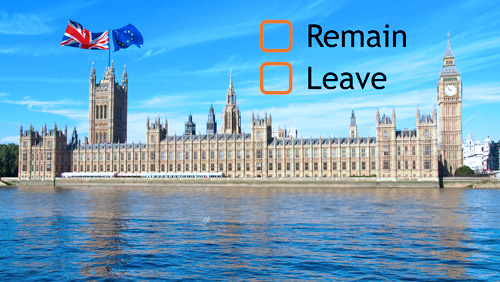EU Vote Too Close to Call – Late Deciders Will Determine Outcome
Uk Voters Put-off by Obama’s Intervention
Washington DC – Eight weeks before polling day, a razor slim, one-point margin separates the respective Leave and Remain campaigns, according to a new poll conducted April 23rd to 26th by the Democracy Institute, a politically independent think tank.
DI Brexit poll: Leave 1 point ahead of Remain  On Thursday 23rd June 2016, the UK will vote either to remain in or leave the European Union. This poll confirms that the referendum outcome remains too close to call, with support for a Brexit — Britain leaving the EU – at 45 percent, while 44 percent of likely voters say they would vote to stay in the EU.
On Thursday 23rd June 2016, the UK will vote either to remain in or leave the European Union. This poll confirms that the referendum outcome remains too close to call, with support for a Brexit — Britain leaving the EU – at 45 percent, while 44 percent of likely voters say they would vote to stay in the EU.
The Leave vote is higher in this poll than in most other recent polls. Two reasons appear to explain the discrepancy, according to poll director Patrick Basham. First, the poll was taken shortly after US President Barack Obama’s intervention, at the behest of Prime Minister David Cameron, on behalf of Remain. “Obama’s lecturing of the British electorate has gone down very badly with most would-be voters, especially on the Leave side and among those now inclined to vote Leave but previously disinclined to bother voting at all,” observes Basham.
The poll found that 60 percent of UK voters considered it inappropriate for Obama to express a preference for how Britain should vote in the EU referendum. Only one-third (34 percent) considered Obama’s intervention to be appropriate. Second, “our poll finds fewer [11 percent] undecided voters because we’ve drilled down to ascertain the actual likelihood of voting, which is skewed in Leave’s favour, especially among older voters,” says Basham.
Voters are divided on whether Britain’s ‘special relationship’ with America would be strengthened or weakened by Britain leaving the EU. Seventeen percent say the relationship would be strengthened, while 20 percent believe it would be weakened. A large majority (63 percent) of those surveyed think it would make no difference.
A lingering drag on the Remain vote is the electorate’s disdain for Prime Minister Cameron’s handling of relations between London and Brussels. The poll finds only 36 percent of voters approving of Cameron’s stewardship of the UK-EU relationship, with 54 percent expressing disapproval. “Voters are increasingly aware of the UK’s £8.5 billion net spend on the EU and, as they blame Cameron for this predicament,” observes Basham, “the prime minister’s record of perceived failure may be the Leave campaign’s greatest asset.”
Polling momentum was clearly with Leave over the weekend, and those supporting Brexit led Remain during the first two days (Saturday and Sunday) of this survey. However, Remain rebounded among poll respondents on Monday and Tuesday, which produced an overall statistical tie for the four nights of polling.
Basham argues that both the Leave and Remain campaigns can take encouragement from these results. “So-called ‘project fear’, the most popular argument for Remain to date, had previously put the political wind at Remain’s back,” he noted. “But, Leave voters are more certain of their choice and, critically, appear more likely to show up to vote on June 23rd.”
Poll Methodology
The fieldwork for this survey of a randomly selected national telephone (landline and mobile) sample of 1,140 United Kingdom voters was conducted by the Democracy Institute’s polling unit from April 23th to April 26th 2016. The survey was conducted via interactive voice response, in which recorded questions were played for randomly-dialled respondents and answers were given via their telephone keypads. The poll has a margin of error of +/- 3 percent at a 95 percent confidence interval. To ensure a representative sample, the results were weighted for key demographic and political variables including, but not limited to, gender, age, education, income, region, voting history, and mobile phone-only households.
Contact
Call +1 202 770 5853 to speak with Patrick Basham about the poll.
Email the Democracy Institute on <[email protected]>